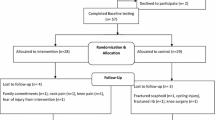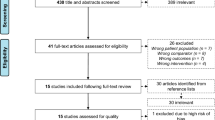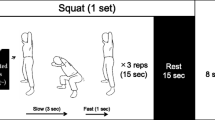Abstract
Summary
A 1-year randomized controlled trial of resistance training compared with a control group was undertaken in 143 men aged 55–80 years. Although hip bone mineral density, lean body mass, and function increased in both groups, lean body mass and function but not bone density increased more in the resistance group.
Introduction
Previous studies have demonstrated a positive effect of resistance training on bone mineral density (BMD) in postmenopausal women, but the effect in men is unclear. The aim was to examine the effect of a 1-year resistance training program on bone and lean body mass in 143 men aged 55–80 years, randomized to either resistance training or active control.
Methods
Resistance exercises were selected to provide loading at the hips. Measurements were taken at 0, 6, and 12 months for BMD (whole body, hip, and spine), lean body mass, strength, and functional fitness.
Results
The intervention showed a significant increase in total hip BMD for both groups at 12 months (active control, 1,014–1,050 mg/cm2; resistance, 1,045–1,054 mg/cm2, p < 0.05) with no increased effect of resistance training compared to active control. However, compared to the active control group, the resistance group increased their lean body mass (active control, 0.1 ± 2.1%; resistance, 1.5 ± 2.7%, p < 0.05), fitness (active control, 4.6 ± 11.1%; resistance, 13.0 ± 13.4%, p < 0.05), and lower limb muscle strength (active control, 14.3 ± 16.8%; resistance, 39.4 ± 30.87%, p < 0.05).
Conclusions
In contrast to previous findings in older women, in older men, a resistance training program does not increase hip bone mass more than walking 30 min three times a week.

Similar content being viewed by others
References
Chambers TJ, Evans M, Gardner TN, Turner-Smith A, Chow JW (1993) Induction of bone formation in rat tail vertebrae by mechanical loading. Bone Miner 20:167–178
Chow JW, Jagger CJ, Chambers TJ (1993) Characterization of osteogenic response to mechanical stimulation in cancellous bone of rat caudal vertebrae. Am J Physiol 265:E340–E347
Turner CH, Robling AG (2005) Mechanisms by which exercise improves bone strength. J Bone Miner Metab 23(Suppl):16–22
Turner CH (2002) Biomechanics of bone: determinants of skeletal fragility and bone quality. Osteoporos Int 13:97–104
Warden SJ, Hurst JA, Sanders MS, Turner CH, Burr DB, Li J (2005) Bone adaptation to a mechanical loading program significantly increases skeletal fatigue resistance. J Bone Miner Res 20:809–816
Martin AD, Daniel M, Clarys JP, Marfell-Jones MJ (2003) Cadaver-assessed validity of anthropometric indicators of adipose tissue distribution. Int J Obes Relat Metab Disord 27:1052–1058
Schriefer JL, Warden SJ, Saxon LK, Robling AG, Turner CH (2005) Cellular accommodation and the response of bone to mechanical loading. J Biomech 38:1838–1845
Burr DB, Robling AG, Turner CH (2002) Effects of biomechanical stress on bones in animals. Bone 30:781–786
Lanyon LE, Rubin CT (1984) Static vs dynamic loads as an influence on bone remodelling. J Biomech 17:897–905
Rubin CT, Lanyon LE (1985) Regulation of bone mass by mechanical strain magnitude. Calcif Tissue Int 37:411–417
Frost HM (1990) Skeletal structural adaptations to mechanical usage (SATMU): 1. Redefining Wolff’s law: the bone modeling problem. Anat Rec 226:403–413
Vuori I, Heinonen A, Sievanen H, Kannus P, Pasanen M, Oja P (1994) Effects of unilateral strength training and detraining on bone mineral density and content in young women: a study of mechanical loading and deloading on human bones. Calcif Tissue Int 55:59–67
Snow-Harter C, Bouxsein ML, Lewis BT, Carter DR, Marcus R (1992) Effects of resistance and endurance exercise on bone mineral status of young women: a randomized exercise intervention trial. J Bone Miner Res 7:761–769
Prince R, Devine A, Dick I, Criddle A, Kerr D, Kent N, Price R, Randell A (1995) The effects of calcium supplementation (milk powder or tablets) and exercise on bone density in postmenopausal women. J Bone Miner Res 10:1068–1075
Lohman T, Going S, Pamenter R, Hall M, Boyden T, Houtkooper L, Ritenbaugh C, Bare L, Hill A, Aickin M (1995) Effects of resistance training on regional and total bone mineral density in premenopausal women: a randomized prospective study. J Bone Miner Res 10:1015–1024
Kerr D, Morton A, Dick I, Prince R (1996) Exercise effects on bone mass in postmenopausal women are site-specific and load-dependent. J Bone Miner Res 11:218–225
Kerr D, Ackland T, Maslen B, Morton A, Prince R (2001) Resistance training over 2 years increases bone mass in calcium-replete postmenopausal women. J Bone Miner Res 16:175–181
Nelson ME, Fiatarone MA, Morganti CM, Trice I, Greenberg RA, Evans WJ (1994) Effects of high-intensity strength training on multiple risk factors for osteoporotic fractures. A randomized controlled trial. JAMA 272:1909–1914
Nelson ME, Fisher EC, Dilmanian FA, Dallal GE, Evans WJ (1991) A 1-y walking program and increased dietary calcium in postmenopausal women: effects on bone. Am J Clin Nutr 53:1304–1311
Nieves JW, Formica C, Ruffing J, Zion M, Garrett P, Lindsay R, Cosman F (2005) Males have larger skeletal size and bone mass than females, despite comparable body size. J Bone Miner Res 20:529–535
Corbin DE (2001) Exercise programming for older adults. In: Darcy P (ed) ACSM’s resource manual for guidelines for exercise testing and prescription. Lippincott Williams & Wilkins, Philadelphia, pp 529–536
Corbin DE (2001) Exercise programming for older adults. Lippincott Williams & Wilkins, Philadelphia
(1999) Get healthy. Be active. Building a healthy, active Australia. In: National Physical Activity Guidelines for Adults. Department of Health and Aged Care, Australian Government
ISAK (2001) International Standards for Anthropometric Assessment. International Society for the Advancement of Kinanthopometry, Potchesfstroom, South Africa
Rikli RE, Jones JC (1999) Development and validation of a functional fitness test for community-residing older adults (Developpement et validation d ’ un test de condition physique fonctionnelle pour des personnes agees residant en maison de retraite). J Aging Phys Act 7:129–161
Dennison E, Eastell R, Fall CDH, Kellingway S, Wood PJ, Cooper C (1999) Determinants of bone loss in elderly men and women: a prospective population-based study. Osteoporos Int 10:384–391
Nguyen ND, Center JR, Eisman JA, Nguyen TV (2007) Bone loss, weight loss, and weight fluctuation predict mortality risk in elderly men and women. J Bone Miner Res 22:1147–1154
Jones G, Nguyen T, Sambrook P, Kelly PJ, Eisman JA (1994) Progressive loss of bone in the femoral neck in elderly people: longitudinal findings from the Dubbo osteoporosis epidemiology study. BMJ 309:691–695
Grove KA, Londeree BR (1992) Bone density in postmenopausal women: high impact vs low impact exercise. Med Sci Sports Exerc 24:1190–1194
Kerr DA (1996) The mechanical and morphometric determinants of bone density. The University of Western Australia, Perth, Department of Medicine
Kukuljan S, Nowson CA, Bass SL, Sanders K, Nicholson GC, Seibel MJ, Salmon J, Daly RM (2009) Effects of a multi-component exercise program and calcium-vitamin-D3-fortified milk on bone mineral density in older men: a randomised controlled trial. Osteoporos Int 20:1241–1251
Nguyen TV, Eisman JA, Kelly PJ, Sambrook PN (1996) Risk factors for osteoporotic fractures in elderly men. Am J Epidemiol 144:255–263
Dennison E, Eastell R, Fall CH, Kellingray S, Wood PJ, Cooper C (1999) Determinants of bone loss in elderly men and women: a prospective population-based study. Osteoporos Int 10:384–391
Kelley GA, Kelley KS, Tran ZV (2000) Exercise and bone mineral density in men: a meta-analysis. J Appl Physiol 88:1730–1736
Menkes A, Mazel S, Redmond RA, Koffler K, Libanati CR, Gundberg CM, Zizic TM, Hagberg JM, Pratley RE, Hurley BF (1993) Strength training increases regional bone mineral density and bone remodeling in middle-aged and older men. J Appl Physiol 74:2478–2484
Ryan AS, Treuth MS, Rubin MA, Miller JP, Nicklas BJ, Landis DM, Pratley RE, Libanati CR, Gundberg CM, Hurley BF (1994) Effects of strength training on bone mineral density: hormonal and bone turnover relationships. J Appl Physiol 77:1678–1684
Kohrt WM, Bloomfield SA, Little KD, Nelson ME, Yingling VR (2004) American College of Sports Medicine Position Stand: physical activity and bone health. Med Sci Sports Exerc 36:1985–1996
Acknowledgments
This study was financially supported by a grant from the Arthritis and Osteoporosis Foundation of Western Australia. Support was also provided by the Department of Endocrinology at Sir Charles Gairdner Hospital, School of Sport Science and Exercise Health at University of Western Australia and Curtin University of Technology. We thank the staff and practical students at the rehabilitation gym of the School of Sport Science and Exercise Health at UWA for assistance with supervision of resistance exercise sessions and strength and fitness testing and the volunteers whose cooperation and dedication made this study possible.
Conflicts of interest
None.
Author information
Authors and Affiliations
Corresponding author
Rights and permissions
About this article
Cite this article
Whiteford, J., Ackland, T.R., Dhaliwal, S.S. et al. Effects of a 1-year randomized controlled trial of resistance training on lower limb bone and muscle structure and function in older men. Osteoporos Int 21, 1529–1536 (2010). https://doi.org/10.1007/s00198-009-1132-6
Received:
Accepted:
Published:
Issue Date:
DOI: https://doi.org/10.1007/s00198-009-1132-6




